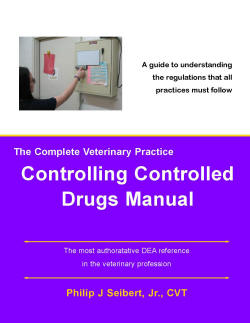Client Refuses Testing
Our veterinarian has prescribed a controlled drug to a patient for a chronic condition, and we want to do regular blood tests to ensure the dosages are right and because we’ve heard about problems with people taking their pets medication. However, the client continues to decline blood level testing.
Is there a regulation or rule that requires regular testing? Should the veterinarian continue to authorize dispensing of the controlled drug without the testing?
Management of chronic medical conditions requires a balance of testing and subjective analysis of progress. It’s unfortunate but when it comes to the dispensing of controlled drugs for chronic conditions, we have many, many case examples of clients using animals to obtain drugs for their personal use or for distribution. The inevitable question is “is the veterinarian liable” for this diversion?
The answer is multi-faceted:
First, the veterinarian is always liable (or responsible) for his or her professional actions. However, when the veterinarian acts in accordance with generally accepted medical practices, the liability is negligible. The question then becomes “is it the expected practice to use laboratory tests to confirm therapeutic levels of pharmaceuticals, especially those with a higher risk of abuse?” The consensus statement from the American College of Veterinary Internal Medicine (ACVIM) suggests initial tests two weeks and six weeks after beginning therapy then at least every six months thereafter.[1],[2] In light of such professional recommendations, failure to regularly test for expected therapy levels may be seen as less than the standard quality of care.
The second consideration is regulatory restrictions. The DEA places specific restrictions on refills for controlled drugs because unused prescription drugs are a major source of diversion to illicit use. Although the DEA does not require periodic laboratory testing of animals on long-term controlled drug therapy, there is an expectation that the veterinarian will exercise reasonable care to ensure the prescriptions are the minimum necessary and they are actually being consumed by the patient. Additionally, some states DO place specific expectations on prescribers for chronic pain management drugs along with reporting requirements for when those drugs are dispensed.
With those considerations, IF or WHEN a person is found to have diverted controlled drugs prescribed for their animal, the DEA will certainly investigate the source of the drugs. If the DEA suspects the veterinarian knew or should have known that the client was not giving the medication to the animal, they can – and have – taken action against the veterinarian. That is especially true when it comes to narcotics and pain medication. If the DEA concludes the veterinarian wasn’t “diligent” in their prescribing, then the state Board of Veterinary Medical Examiners will also likely get involved.
There’s an old adage that goes “When the feces hits the fan, the stink will stick to everybody.” That means it’s not just the “user” that gets in trouble when busted, but maybe also the “supplier!” So our advice is simple: when it comes to long-term therapy using controlled drugs, convince the client about the need for regular testing of therapy levels. If the client continues to refuse, it MAY be a sign that something isn’t right. In the end, the veterinarian has a professional responsibility to do what’s right for the patient, but also to practice a little Self-Preservation at the same time. It’s perfectly reasonable for a veterinarian to require tests to determine therapy levels and if the client refuses, the veterinarian may refuse to reauthorize the prescription.
[1]
https://onlinelibrary.wiley.com/doi/full/10.1111/jvim.13841
[2]
https://veterinarypartner.vin.com/default.aspx?pid=19239&id=4951404
Did You Know...?
According to a study published in the Journal of the AVMA, "vet-shopping" behavior (the solicitation of controlled substance prescriptions from multiple veterinarians for misuse) is rising:
"From 2014 through 2019, the number of patients with prescriptions for any class of controlled substances from ≥ 4 veterinarians tripled from 935 to 2,875 (+207.5%). The number of patients with opioid cough-and-cold medication prescriptions from ≥ 4 veterinarians rose from 150 to 1,348 (+798.9%). The corresponding number for benzodiazepines rose from 185 to 440 (+137.8%). The corresponding number for opioid analgesics peaked at 868 in 2016 before decreasing to 733 in 2019."
https://avmajournals.avma.org/view/journals/ajvr/83/2/ajvr.21.10.0173.xml
Check out our Controlling Controlled Drugs Manual for practical solutions to controlled drug issues.

